Filter by
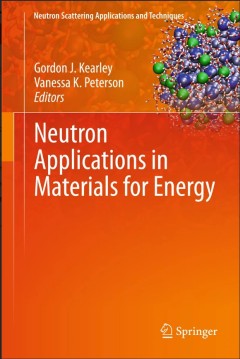
Neutron Applications in Materials for Energy
Neutron Applications in Materials for Energy collects results and conclusions of recent neutron-based investigations of materials that are important in the development of sustainable energy. Chapters are authored by leading scientists with hands-on experience in the field, providing overviews, recent highlights, and case-studies to illustrate the applicability of one or more neutron-based techn…
- Edition
- 1
- ISBN/ISSN
- 978-3-319-34321-1
- Collation
- X
- Series Title
- Neutron Scattering Applications and Techniques
- Call Number
- -

A Thermochemical Heat Storage System for Households: Combined Investigations …
The book offers a comprehensive report on the design and optimization of a thermochemical heat storage system for use in buildings. It combines theoretical and experimental work, with a special emphasis on model-based methods. It describes the numerical modeling of the heat exchanger, which allows recovery of about two thirds of the waste heat from both solar and thermal energy. The book also p…
- Edition
- Ed. 1
- ISBN/ISSN
- 978-3-319-41228-3
- Collation
- XXIII, 202
- Series Title
- Springer Theses
- Call Number
- 541.36 LEL t
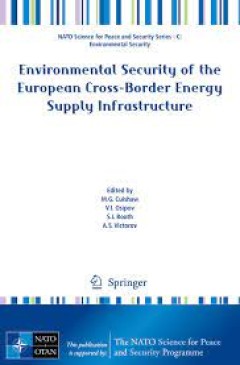
Environmental Security of the European Cross-Border Energy Supply Infrastructure
The current volume provides examples of how environmental hazards such as landslides, earthquakes, mountain processes, cold climate processes and tidal flows and currents can affect the energy supply infrastructure. In times of uncertainty, the security of the European cross-border energy supply infrastructure, such as pipelines, has great importance. Whilst the potential effects of political d…
- Edition
- -
- ISBN/ISSN
- 978-94-017-9538-8
- Collation
- 24 b/w illustrations, 74 illustrations in colour
- Series Title
- -
- Call Number
- -
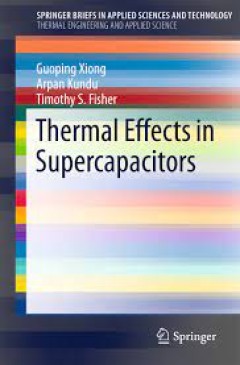
Thermal Effects in Supercapacitors
This Brief reviews contemporary research conducted in university and industry laboratories on thermal management in electrochemical energy storage systems (capacitors and batteries) that have been widely used as power sources in many practical applications, such as automobiles, hybrid transport, renewable energy installations, power backup and electronic devices. Placing a particular emphasis o…
- Edition
- -
- ISBN/ISSN
- 978-3-319-20242-6
- Collation
- 8 b/w illustrations, 24 illustrations in colour
- Series Title
- -
- Call Number
- -
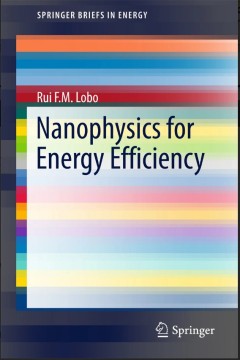
Nanophysics for Energy Efficiency
This book provides a succinct account of the ways in which nano technology is being applied to improve energy efficiency. The coverage includes current scanning probe techniques for electrical energy storage, energy harvesting systems and local electrochemistry as well as emerging techniques of relevance to diverse materials and devices, including advanced scanning probes for nano fabrication a…
- Edition
- 1
- ISBN/ISSN
- 2191-5520
- Collation
- XXIII, 73
- Series Title
- SpringerBriefs in Energy
- Call Number
- -
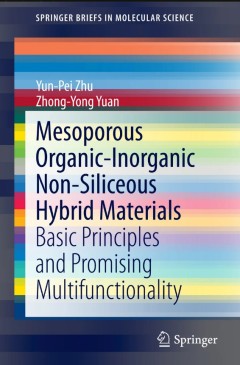
Mesoporous Organic-Inorganic Non-Siliceous Hybrid Materials
This book provides extensive information on organic-inorganic hybrid materials with controllable compositions and structures developed over the past few decades, including metal sulfonates, carboxylates, phosphonates, metal-organic frameworks (MOFs), etc. A variety of judicious strategies for optimizing mesoporosity are also introduced, aiming at realizing the corresponding superiorities of hyb…
- Edition
- 1
- ISBN/ISSN
- 978-3-662-45633-0
- Collation
- VIII, 121
- Series Title
- SpringerBriefs in Molecular Science
- Call Number
- -
 Computer Science, Information & General Works
Computer Science, Information & General Works  Philosophy & Psychology
Philosophy & Psychology  Religion
Religion  Social Sciences
Social Sciences  Language
Language  Pure Science
Pure Science  Applied Sciences
Applied Sciences  Art & Recreation
Art & Recreation  Literature
Literature  History & Geography
History & Geography